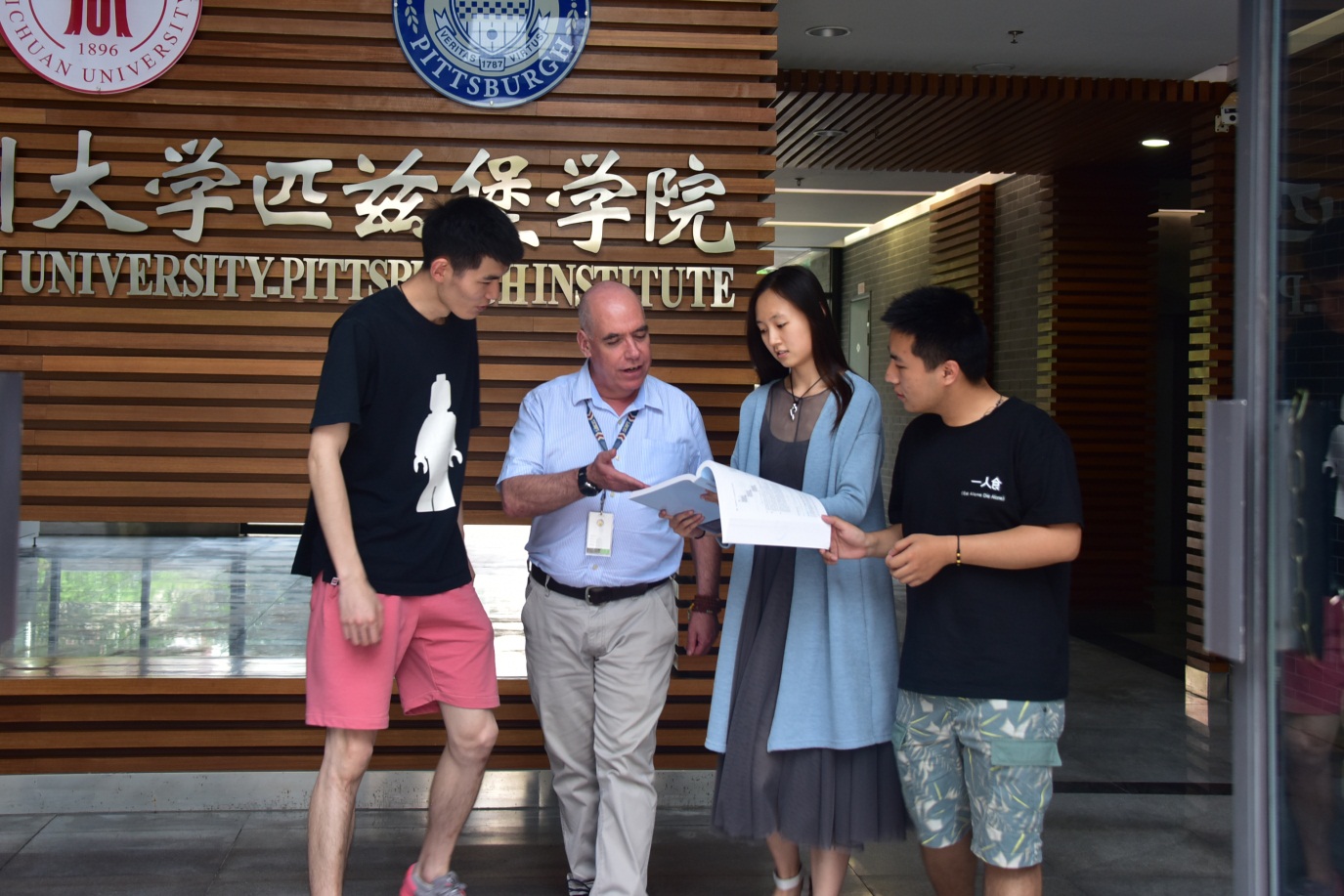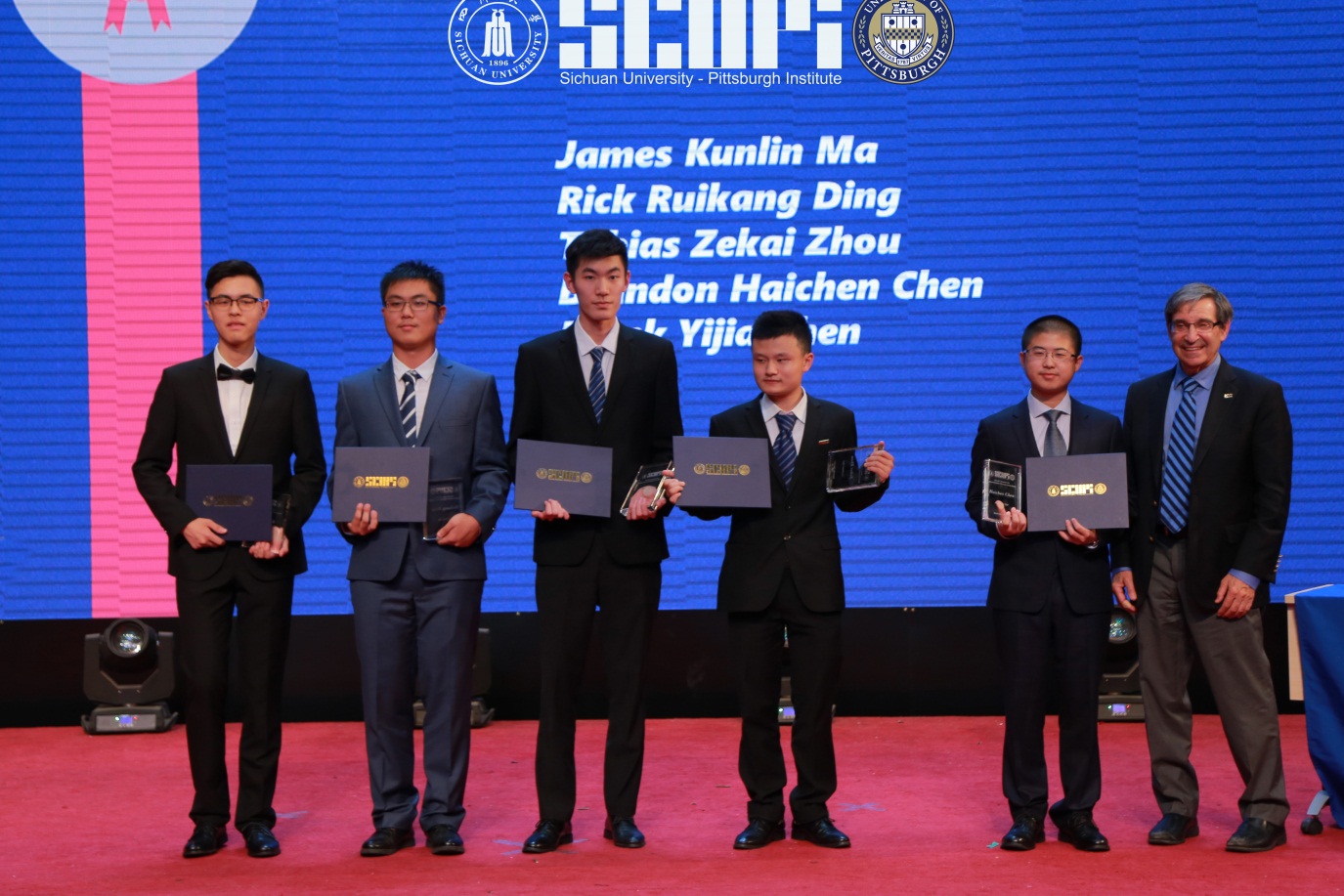Sichuan University-Pittsburgh Institute will graduate its first undergraduate class in June this year. As of this report, 88% of the first batch of undergraduates will proceed to study in a graduate school either at home or abroad. Since foreign graduate schools are still working on their applications, it is estimated that the final rate will exceed 90%. It is slightly higher than the average proportion of Tsinghua University and Peking University respectively in terms of the number of undergraduates seeking advanced degrees. Of the students proceeding to a graduate program, 20% will study in China and over 68% will do overseas. So far, 53 students have been admitted into a first-class university abroad: University of California, Berkeley (5), Cornell University (4), Carnegie-Mellon University (2), University of Pennsylvania (2), Duke University (2), Northwest University (2), University of Southern California (2), New York University (3), Georgia Institute of Technology (3), University of Illinois at Champaign (2), University of Wisconsin at Madison (2), Pennsylvania State University (4), University of Washington (4), Case Western Reserve University, University College London, Warwick University and University of Pittsburgh. Several students have been admitted into a master-doctorate program on a full scholarship.
Why does the newly founded Pittsburgh Institute have such a high rate of students seeking further education? SCU reporters interviewed the relevant leaders of the college to reveal the new engineering education mode behind the high rate of advanced education, which is to build a multi-integrated international innovation engineer training system centering around students, and provide all-round support for students in their further education in respect to teaching philosophy, student development, personality shaping, practical ability and so on.
Strengthening students’ sense of becoming a person of great ability-to incorporate an international vision into academic planning from the very beginning

When the Pittsburgh Institute freshmen first arrived on campus, they were able to work closely with all professors during the week of orientation. They would get information about the study mode and requirements at the institute and abroad: How to adapt to an English teaching environment? How to take advantage of professors’ “office hours”? How to read and understand a syllabus and make the best use of resources at the college? By means of workshops and one-on-one interviews, a student advisor and teaching affairs personnel, who had experiences overseas, would help individual freshmen set up goals, visions and work out plans to seek further education at a world first-class university. As a result, the Pittsburgh institute developed in students a firm belief and a solid foundation, serving as a springboard for students to seek further education in a world first-class university.
Adopting a holistic approach—the institute has devised a unique training program characterized by cross-culture communication and development of humanistic quality

In order to assist students to adapt to an international teaching environment, the institute took proactive measures to sharpen students’ English communication skills before they started to take subject courses. For instance, the freshmen would take English placement tests so that the institute could provide individual students with suitable classes and materials based upon their levels. In cooperation with the Writing Center of the University of Pittsburgh and Wu Yuzhang College, an English Writing Center has been established to create a one-on-one teaching mechanism in order to provide students with academic English writing assistance and a functional module-based workshop to improve their English competence. In terms of teacher allocation and curriculum integration, an independent and strong team of Humanities teachers has been set up, drawing upon the concept of whole-person teaching. The teaching system of combining English writing with humanistic quality emphasizes the importance of academic integrity and avoiding plagiarism, and strengthens the awareness of division of labor and cooperation in team projects.
Teaching as a way to provide further education opportunities— to enrich professional knowledge and boost international competitiveness

The institute effectively takes advantage of its international platform and creates curriculum and training method that fit in with those of a foreign first-class university. Adopting ABET of the University of Pittsburgh, the institute encourages students to be innovative and take initiative in an English instruction environment. In collaboration with the Engineering Education Research Center of University of Pittsburgh, the institute has designed a monitoring and evaluation system of teaching quality for the whole process, taking fully into account the learning mode and characteristics of Chinese students. This system includes midterm and end of semester evaluations of teachers by students, whereby all students are allowed to evaluate each course and teacher based on their teaching objectives and effectiveness, and to observe and remark on the way teachers actually teach the class with a scale focusing on "active learning behavior". The institute's teaching and management mechanism is based on the "Blackboard" software, an international standardized online system. According to the special needs of the institute, it has also written an expansion program to share courseware, enable group learning, manage students’ files, and keep track of coursework and performance.In addition to the overall teaching management, the institute will conduct one-on-one or focus group interviews with all students, and establish individualized data and materials for students' learning and curriculum evaluation each semester. With the help of diversified teaching management and evaluation systems, the training process and learning experience of students form a real-time record bank from the beginning of enrollment, which shows the students' orientation for further study and their potential for getting admitted into prestigious universities.
Practice as a way to set up a stage of further education—to heighten comprehensive ability and international attainment.

The institute is concerned about students' studies, and more so about the development of students' comprehensive abilities. It creates sufficient conditions for students to actively explore their own development direction and cultivate their abilities in all aspects so as to achieve a more balanced development. This has enabled students to excel in the fierce competition worldwide, getting recognized by foreign first-class universities. Moreover, the institute encourages students to have a diversified knowledge scope and affirms their efforts through Innovative Engineer Award, Entrepreneurship Award and Diplomat Award. By setting up Outstanding Leader Award, Emerging Leader Award, Community Contribution Award, Best Contribution Award, among others, the institute encourages and cultivates students' leadership, responsibility and dedication. Furthermore, the institute actively organizes students to participate in such major competitions as the National College Student Robot Competition, the American Mathematical Modeling Competition, the National University Student Machinery Innovation Design Competition, and the National Innovation and Entrepreneurship Competition so as to stimulate and encourage students to tap into their interdisciplinary innovation potential. In particular, the institute has focused on building a long-term mechanism for close integration of industry, education and research, establishing diversified cooperation with world-renowned enterprises. In March this year, for instance, it signed a cooperative agreement with a world-renowned 3D printing enterprise to promote students to "do while learning, learn while doing". As a result, they students would enhance their learning experience with such elements as internationalization, innovation and entrepreneurship so that they can increase their chances of getting admitted into world first-class engineering colleges.
The rank and file faculty and staff join efforts in expanding channels and assisting students to get into a prestigious graduate school.

Study Abroad Counseling was established at the founding of the institute. On the one hand, it helps students to improve their TOEFL and other test taking skills as well as English learning abilities. On the other hand, it helps the institute to expand channels to cooperate with famous overseas universities in hopes to boost students’ chances of getting admitted. When the students of Class 2015 entered the senior year in 2018, the institute administration began to mobilize the whole staff to provide all-round services for students to apply to prestigious universities. In particular, professors, with Dean Minjing Qiu as their representative, took the trouble to write letters of recommendation for students despite their busy work. They recommended students, highlighting each student's different strengths and talents in accordance to the major and university that individual student was applying to. With customized letters of recommendation for individual applicants, the institute has managed to help overseas first-class universities recognize and accept its students.
